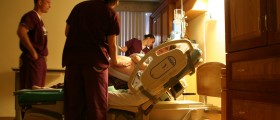
Down syndrome is a genetic disease or, more precisely, a chromosomal condition that is caused by an extra pair of 21st chromosome. This actually means that the 21st chromosome, in patients affected with Down syndrome, has an extra copy of genetic material. This excess genetic information causes some impairment of cognitive ability and physical growth, as well as a set of common physical characteristics. This is a rare disease that affects one individual per 800 to one per 1000 births. The estimated rate in the United States is one per 733 live births. Down syndrome affects all ethnic groups and people of all economic classes.
Signs and symptoms of Down syndrome
People affected with Down syndrome share some common physical features. These individuals are usually having an unusually round face, abnormally small chin, protruding and often oversized tongue, almond-shaped eyes, a skin fold of the upper eyelid, and single transverse palmar crease. Children with Down syndrome usually have poor muscle tone and larger space between the big and second toes. They usually suffer some degree of impairment of cognitive ability, having an average IQ of 50. A small number of children will also have a severe or high extent of intellectual disability. Unfortunately, these children demand a lot of medical attention, since they usually have higher risk of heart diseases, a skin fold of the upper eyelid, thyroid problems, and sleep apnea.
Therapy for children with Down syndrome
Down syndrome cannot be cured but there are a lot of treatment options that may help to manage symptoms of the condition, as well as other medical conditions associated with Down syndrome. Early detection of this disease, and early involvement in treatment, may help these children acquire some developmental milestones and prepare them to live long and fruitful lives.
Children with Down syndrome may have varying degrees of increased risk for certain medical problems. Different treatment options are available for managing these additional ailments. Often, treatment for children involves some medications, carefully selected to address particular health issues.
Children suffering seizures will, for example, take anti-seizure medications, while those with thyroid problems may need to take thyroid replacement hormones.
Children’s hearing and vision problems are usually evaluated and managed by audiologist and ophthalmologist. If a child has some congenital heart defects, pediatrician may suggest a surgical treatment.
Children with Down syndrome will also benefit from physical therapy that offers carefully tailored solutions for motor development. Speech therapy is also an important part of treatment that can help children to learn how to communicate clearly.















-In-Infants-And-Older-Children_f_280x120.jpg)
-And-Children-16-Warning-Signs-And-Symptoms_f_280x120.jpg)
Your thoughts on this
Loading...